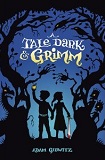
Reviewed April 14, 2011.
Dutton Children's Books, 2010. 256 pages.
Here's another book that appeared in School Library Journal's Battle of the Kids' Books. To celebrate the excellent battle action this year, I'm posting reviews of books from the Battle, and including commentary from the distinguished judges. This will give you an idea of the stellar critiques that make sljBoB so entertaining.
In the first round, this book drew a judge whose readers I think are just perfect for A Tale Dark and Grimm: R. L. Stine. He talked at length about why he chose it to win:
When I was in elementary school, I was already fascinated by the worlds of fantasy and magic and horror. I read every book of fairy tales in our school library. I then proceeded to our town library where I moved up and down the shelves of fairy tales, Norse legends, and Greek myths, devouring book after book.
As a long-time devotee of these stories, I opened Adam Gidwitz’ A Tale Dark and Grimm with great anticipation. I’m happy to say the book provided a wonderful return to the Grimm world—the world of dark woods, unspeakable evil, not-so-innocent children, witches, dragons, and more—that had enthralled me as a child.
Gidwitz has not only presented us with a masterful retelling and re-imagining of the original Grimm works. His book provides a wonderful lesson in story-telling—how stories are made, how they can be twisted and turned, and how they change over time.
The book is inviting right from the start. The author warns that the old Hansel and Gretel story isn’t what you expect, that fairy tales aren’t for the faint-of-heart. His warning that “the one true tale is as violent and bloody as you can imagine” makes the book irresistible. Who could stop reading after a warning like that?
He then presents a retelling of several Grimm tales, beginning with Hansel and Gretel and using them as protagonists for the ensuing stories. We follow the brother and sister from adventure to adventure, into the woods and out, into king’s castles and witch’s hovels, into deep darkness, and finally to redemption– and even a happy ending. Thus he has cleverly tied the stories together and turned them into a novel.
Gidwitz’ writing is simple, clean, easy-to-read. In a word: delightful. He manages to capture all the dark feelings and atmosphere of the original tales in language appealing to kids today. He doesn’t modernize. He doesn’t camp it up. The writing is crisp and clear, and he takes the story-telling seriously.
However, in the second round, A Tale Dark and Grimm lost to Trash, by Andy Mulligan. Judge Pete Hautman still had good things to say about A Tale Dark and Grimm. I love the way he explains why kids might enjoy it more than adults:
I felt a little uncomfortable stepping into these books. Okay, I’ll admit it—I like happy books that make me glad I am who I am. Murderous parents, child-eating witches, orphaned trash pickers, and monstrously corrupt politicians do not make me feel good about being human. But that’s because I’m a grownup, all tender and vulnerable and fiercely protective of my comfort level. Younger readers are more adventurous. As was I, once upon a time. Clearly, to give these books a fair shake I would have to channel my younger self.
In A Tale Dark and Grimm, Adam Gidwitz makes it easy. These fairly straightforward retellings are interrupted, frequently, by the author, who offers warnings (“This next bit is a bit gross,”) commentary (“No, I didn’t think the moon ate people either. But is says so, right in the original Grimm,”) and alternate endings to several of the tales. There is a forbidden fruit deliciousness here—like being a kid and having your most favorite and funniest uncle telling you stories that might make your overly-protective helicopter parents blanch.
For me, I enjoyed the book. I like the way it reminded me of reading the Grimm fairy tales as a kid. The book is clever and well-written and nicely plotted -- but it didn't win my heart. The fact is, I like the original tales better. And I admit my favorites were the happier, princess-filled tales. I wasn't ever really a fan of the ones with heads chopped off. This book ended up with a very different tone than what I remember from being a little girl reading fairy tales.
However, I think my boys would have loved it! When they were around upper elementary or middle school age. This would have made an excellent family read-aloud. And I'm looking forward to recommending this book to boys in the library, especially ones who like a little blood and gore. This is a perfect book to hand to a boy who's been reading A Series of Unfortunate Events, or, yes, R. L. Stine's books.
Now if you'll excuse me, I think I'll go enjoy a fairy tale or two.

 A Tale Dark and Grimm
A Tale Dark and Grimm